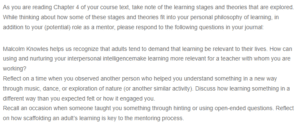Enhancing Learning Through Interpersonal Intelligence
Using my nurturing interpersonal intelligence means working closely with my fellow teachers. Assume I work with other tutors to discourse issues that might arise. Posing and answering queries that each of us is likely to have is one of the means that utilizing and nurturing your emotional aptitude makes learning more vital for the other tutors we work with.
A colleague once assisted me in understanding something new through music and dance at work while training at John’s music band. My role was to train with John and his music band members. This exercise taught me how to capture children’s attention through movement and music. It also helped me know other means of getting back children’s attention. For example, as a teacher, I realized I could use music, movement, and dance to help children refocus their attention on learning. Through the training by my colleagues, I learned that there is never an age limit to dance and music within a classroom. Dance and music are great ways of getting learners to refocus on learning. It is also a way teachers can bond with children
The first time I was taught something through hinting was when I volunteered at a CDC centre, and a group of learners were to visit a CDC base. However, the class had so many allergic children. Since I was a new employee in the CDC room and the visiting class had so many allergic kids, the lead educator and co-tutor developed an abbreviation for the learners to identify the ones who were hypersensitive to different things. Unfortunately, the co-teacher had forgotten the allergic kids, but the lead teacher said the A.A.L (All allergic learners) abbreviation. Immediately all allergic learners moved aside. The teachers then explained that the (AAL) recalled learners allergic to different things from the class. From that scenario, I learned how to identify and recognize all the allergic learners in the class. Chu (2014) says that scaffolding by a different individual supports the students to accomplish more than what is possible through their independent revelation. This is what Vygotsky termed the zone of proximal development.
Reference
Chu, M. (2014). Developing mentoring and coaching relationships in early care and education: A reflective approach. Boston: Pearson
ORDER A PLAGIARISM-FREE PAPER HERE
We’ll write everything from scratch
Question
As you are reading Chapter 4 of your course text, take note of the learning stages and theories that are explored. While thinking about how some of these stages and theories fit into your personal philosophy of learning, in addition to your (potential) role as a mentor, please respond to the following questions in your journal:

Enhancing Learning Through Interpersonal Intelligence
Malcolm Knowles helps us recognize that adults tend to demand that learning be relevant to their lives. How can using and nurturing your interpersonal intelligencemake learning more relevant for a teacher with whom you are working?
Reflect on a time when you observed another person who helped you understand something in a new way through music, dance, or exploration of nature (or another similar activity). Discuss how learning something in a different way than you expected felt or how it engaged you.
Recall an occasion when someone taught you something through hinting or using open-ended questions. Reflect on how scaffolding an adult’s learning is key to the mentoring process.


